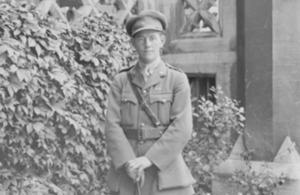WW1 Australian VC recipient William Ruthven
The story of Australian First World War Victoria Cross recipient William Ruthven.

William Ruthven [Credit: Australian War Memorial D00019]
66 men from Australia received the Victoria Cross, Britain’s highest award for gallantry, during the First World War. As part of the Centenary Commemorations the people of the United Kingdom marked their gratitude to those courageous men by presenting a bronze memorial plaque to their home country engraved with their names. The plaque is now displayed at the Australian War Memorial. This archive tells their stories.
Name: William Ruthven
DOB: 21 May 1893
Place of Birth: Melbourne, Australia
Date of Action: 19 May 1918
Place of Action: Ville-sur-Ancre, France
Rank: Sergeant
Regiment: 22nd Battalion, Australian Imperial Force
William Ruthven, known as Rusty, was born on 21 May 1893 in Melbourne, Australia, and was a mechanic in the timber industry until he enlisted in the Australian Imperial Force in April 1915. He served at Gallipoli before transferring to the Western Front.
Sergeant Ruthven whilst serving with the 22nd Battalion, was awarded the Victoria Cross for his actions at Ville-sur-Ancre in France on 19 May 1918. During an attack, he took command of a company after the officer in charge was wounded. His citation explains further:
For most conspicuous bravery and initiative in action. During the advance Sjt. Ruthven’s company suffered numerous casualties, and his company commander was severely wounded. He thereupon assumed command of this portion of the assault, took charge of the company headquarters, and rallied the section in his vicinity.As the leading wave approached its objective it was subjected to heavy fire from an enemy machine-gun at close range. Without hesitation he at once sprang out, threw a bomb which landed beside the post, and rushed the position, bayoneting one of the crew and capturing the gun. He then encountered some of the enemy coming out of a shelter. He wounded two, captured six others in the same position, and handed them over to an escort from the leading wave, which had now reached the objective. Sjt. Ruthven then reorganised the men in his vicinity and established a post in the second objective.Observing enemy movement in a sunken road near by, he, without hesitation and armed only with a revolver, went over the open alone and rushed the position, shooting two enemy who refused to come out of their dug-outs. He then single-handed mopped up this post and captured the whole of the garrison, amounting in all to thirty-two, and kept them until assistance arrived to escort them back to our lines. During the remainder of the day this gallant non-commissioned officer set a splendid example of leadership, moving up and down his position under fire, supervising consolidation and encouraging his men. Throughout the whole operation he showed the most magnificent courage and determination, inspiring everyone by his fine fighting spirit, his remarkable courage, and his dashing action.
He survived the war and returned to Australia. From 1945 to 1961, Ruthven was a member of the Victorian parliament. He died in 1970.